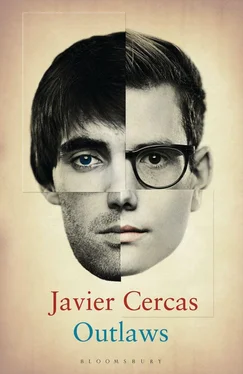When Cortés finished giving me news about Zarco he asked: Well, what do you plan to do? I didn’t have to think before answering. Tomorrow I’ll go see him, I said. Cortés made an affectedly polite gesture and asked, lowering his voice: Should I take this to mean that you plan to offer him our services? What do you think? I answered. Cortés laughed. You’re going to get us into one hell of a shitstorm, he said, going back to his normal voice. But if you didn’t I’d kill you.
‘Although my partner knew nothing about the relationship I’d had with Zarco, what he said was not contradictory: all Zarco’s relationships with his lawyers had ended badly (and some of them very badly); in spite of that, Zarco was still Zarco and, if the matter was handled skilfully, defending him could still be very lucrative for a legal firm. Besides, I’d often felt tempted to offer to defend Zarco, but, for one reason or another, I’d always resisted; now, when Zarco had just returned to Gerona almost like an archaeological relic or a forgotten wretch, when for everyone else he was little less than a hopeless or closed case after having spent his life in prison and having wasted several opportunities for rehabilitation, I thought it was the moment to give in to temptation.
‘I wasn’t the only one to think so. That very afternoon, while I was working on my submissions for a court appearance the following day, my secretary told me two women were waiting to see me. A little annoyed, I asked her if the two women had an appointment and she said no, but added that they’d insisted on seeing me to talk about a certain Antonio Gamallo; even more annoyed, I told her to make an appointment for the two women for another day, and then asked her not to disturb me again. But I still hadn’t gone back to concentrating on my papers when I looked up from my desk and heard myself repeat out loud the name my secretary had just uttered; I stood up and rushed out to the waiting room. There were the two women, still seated. They turned towards me and I recognized them immediately: one I’d seen in photos recently, alone or with Zarco; the other was Tere.’
‘Our Tere?’
‘Who else? Over those last twenty years I had thought of her sometimes, but it had never occurred to me to look for her or ask about her whereabouts; nor would I have known where to look or who to ask. And now, suddenly, there she was. An intense silence settled on the waiting room while Tere and I stared at each other without moving; or almost without moving: I quickly noticed that her left leg was going up and down like a piston, just as it did when she was sixteen. After a couple of very long seconds, Tere stood up from her chair and said: Hiya, Gafitas. At first I thought she’d hardly changed, perhaps because her lean body and jeans and worn leather jacket and handbag strap across her chest gave her a youthful air; but I soon spied the ravages of age: the tired skin, crow’s feet, circles under her eyes, the corners of her mouth turned down, a sprinkling of grey hairs; only her eyes were just as green and intense as they were twenty years ago, as if the Tere I’d known had taken refuge there, indifferent to the passage of time. I held out my hand mumbling exclamations of surprise and meaningless questions; Tere answered cheerfully, ignored my hand and kissed me on the cheek. Then she introduced me to the woman with her. She said she was called María Vela and that she was Zarco’s girlfriend, although she didn’t say girlfriend she said partner and she didn’t say Zarco but Antonio. I did shake María’s hand. And only then did I actually notice her, a somewhat younger woman than Tere, skinny and plain, short, chestnut-coloured hair, very pale skin, wearing a heavy, poor-quality, black coat over a pink tracksuit zipped up to the neck.
Once the introductions were done, the two women went into my office. I offered them a seat, coffee and water (they only accepted the seat and the water) and Tere and I began to talk. She told me she was living in Vilarroja, working at a cork factory in Cassà de la Selva and studying nursing by correspondence. Really? I asked. Does that surprise you? she answered. I found it very surprising, but I pretended it didn’t surprise me. Tere seemed very happy to see me. María listened to us without taking part, but without missing a word of the conversation; I didn’t know if Tere had told her about my former friendship with Zarco and with her, and at some point I pretended that Cortés hadn’t told me of Zarco’s arrival that morning and asked how he was. He’s here, answered Tere. That’s why we’ve come to see you.
‘Then Tere got to the point. She told me they wanted me to defend Zarco at a trial to be held in Barcelona in a few months’ time, a trial in which Zarco would be accused of assaulting two guards at the Brians prison. Of course, Tere took it for granted that I knew, as everyone did, who Zarco had turned into over the years, so she skipped straight to putting me in the picture and backing up her proposal drawing an exultant panorama of Zarco’s situation: she told me that three years earlier they’d managed to get him back to a Catalan prison, specifically the Quatre Camins, and that, after three years of good behaviour and the Catalan government’s new director-general of prisons, Señor Pere Prada, taking an interest in his case, he had just been transferred to the Gerona prison, a perfect prison because María also lived in the city and because it was a small, secure prison with a high rate of rehabilitation; she also explained that Zarco was innocent of the offence with which he’d been charged, handed me a copy of the indictment and his prison record in a cardboard file folder, assured me that his physical condition and his morale were excellent, that he’d stopped using heroin, that he was very keen to get out of prison and that she and María were doing everything they could to get him out as soon as possible. Up till that moment Tere spoke without looking at me, setting out the case as if she had set it out before, or as if she were reciting it; for my part I listened to her while feigning to read through the documents she’d handed me and looking back and forth from her to María. Right, Tere concluded, and we finally looked at each other. We know you have a lot of work, but if you could give us a hand we’d be grateful.
‘She fell silent. I sighed. Tere had beat me to the proposal I was planning to put to Zarco the next day; so, in theory, it was all very easy: both sides wanted the same thing. But instinct told me it wasn’t in my interest to let my visitors know, that what suited me would be to offer a little resistance before accepting, to earn their gratitude letting them think I was making a sacrifice accepting Zarco’s defence, that I was only accepting reluctantly and in any case they should consider it a privilege that I might want to be their lawyer. I put the folder with the indictment in it down on the coffee table and began by asking: Does Zarco know about this? I was about to explain what I meant when María intervened. We would prefer you not call him Zarco, she reproached me in a timid voice with a pained expression on her face. His name is Antonio. He doesn’t like to be called that; and we don’t like it either. Zarco was another person: none of us want anything to do with him. Surprised by María’s reprimand, I nodded, apologized and looked to Tere, but couldn’t catch her eye; she was concentrating on lighting a cigarette. I cleared my throat and carried on, directing my question to María: What I was asking is whether Antonio knows that you two have come to ask me to defend him. Of course he knows, said María, scandalized. I never do anything behind Antonio’s back. Besides, the idea that you should be his lawyer was his. Antonio’s? I asked. Yes, said María. And since when does Antonio know that I’m a lawyer? I asked. María looked at me as though she didn’t understand the question; then she looked at Tere, who rubbed the mole beside her nose with the same hand that held her cigarette before answering: I told him. She smiled and said: You’re famous, Gafitas. The papers talk about you all the time. On TV too.
Читать дальше












